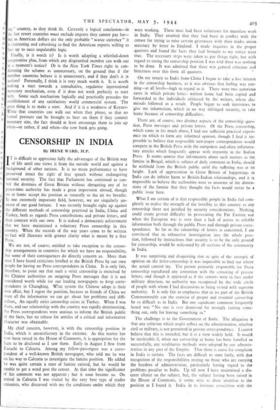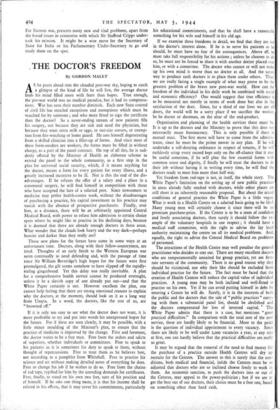CENSORSHIP IN INDIA
By IRENE WARD, M.P.
IT is difficult to appreciate fully the advantages of the British way
of life until one views it from the outside world and against a background of other nations. It is no mean performance to have preserved intact the right of free speech without endangering national security. The fact that Parliament has continued to con- trol the destinies of Great Britain without abrogating any of its peace-time authority has made a great impression abroad, though we at home accept the position as naturally as the air we breathe. In one extremely important field, however, we are singularly un- aware of our good fortune. I was recently brought right up against the different methods of censorship practised in India, China and Turkey, both as regards Press contributions and private letters, and their contrast with our own. It is indeed a democratic achievement that we have maintained a voluntary Press censorship in this country. When the records of the war years come to be written no fact will illustrate with greater clarity what is meant by a free Press.
We are not, of course, entitled to take exception to the censor- ship arrangements in countries for which we have no responsibility, but some of their consequences do directly concern us. More than once I have heard criticisms levelled at the British Press by our own people for having no Press correspondents in China. It is only fair, therefore, to point out that such a strict censorship is exercised by the Chinese authorities on outgoing Press messages that it is not considered worth while for our leading newspapers to keep corre- spondents in Chungking. What system the Chinese adopt is their own affair, but I regret the position, because as friends of China we want all the information we can get about her problems and diffi- culties,, An equally strict censorship exists in Turkey. When I was there, and our relationship with the country was rapidly deteriorating, the Press correspondents were anxious to inform the British public of the facts, but no release for articles of a critical and informative character was obtainable.
My chief concern, however, is with the censorship position in India, which is unsatisfactory in the extreme. As this matter has now been raised in the House of Commons, it is appropriate for the facts to be disclosed as I saw them. Early in August I flew from Karachi to Calcutta. Among my fellow-passengers was a corre- pondent of a well-known British newspaper, who told me he was on his way to Calcutta to investigate the famine position. He added he was quite certain a state of famine existed, but he would be unable to get a word past the censor. At that time the significance of his comment was not apparent ; but it soon became so. On arrival in Calcutta I was visited by the very best type of trades unionists, who discussed with me the conditions under which they were working. These men had been volunteers for munition work in India. They asserted that they had been in conflict with the censor for trying to raise certain grievances with their trades union secretary by letter to England. I made inquiries in the proper quarters and found the facts they had brought to my notice were true. The necessary steps were taken to put things right, but with regard to easing the censorship position I was told there was nothing to be done. It was admitted that there was general criticism and bitterness over this from all quarters.
-On my return to India from China I began to take a live interest in the censorship business, as it was obvious that feeling was run- ning—at all levels—high in regard to it. There were two notorious cases in which private letters written home had been copied and forwarded to the individuals criticised by the writers, whose dis- missals followed as a result. People began to seek interviews to give me information, which in no way infringed security, to take home because of censorship difficulties.
There are, of course, two distinct aspects of the censorship ques- tion, Press messages and private letters. Of the Press censorship, which came in for much abuse, I had not sufficient practical experi- ence on which to form any informed opinion, though I find it im- possible 'to believe that responsible newspaper correspondents would compete in the British Press with the outspoken and often inflamma- tory articles which frequently appear with impunity in the Indian Press. It seems unwise that information about such matters as the famine in Bengal, which is subject of daily comment in India, should be withheld from the British public until the suffering was at its height. Lack of appreciation in Great Britain of happenings in India can do infinite harm to British-Indian relationships, and it is impossible to believe the authorities were so unaware of the dimen- sions of the famine that they thought the facts would never be a public •issue here.
What I am certain of is that responsible people in India fail com- pletely to realise the strength of the hostility in this country to any censorship there not justified by security considerations. Nothing could create greater difficulty in prosecuting the Far Eastern war when the European war is over than a lack of access to reliable information both through the public Press and through private corre- spondence. So far as the censorship of letters is concerned, I am convinced that an exhaustive investigation into the whole posi- tion, followed by instructions that security is to be the only ground for censorship, would be welcomed by all sections of the community in India.
It was surprising and disquieting that in spite of the strength of opinion on the letter-censorship it was impossible to find out where the actual control lay. The person primarily responsible for Press censorship repudiated any connexion with the censoring of private letters, and though it appeared as if the censors were in fact under military direction, no authority was recognised by the wide circle of people with whom I had discussions as being vested with supreme authority. It is only fair to emphasise that in no part of the British Commonwealth can the exercise of proper and essential censorship be so difficult as in India. But one significant comment frequently heard was "No one is ever dismissed for wrongly cutting some- thing out, only for leaving something in."
The challenge is to the Government of India. The allegation is that any criticism which might reflect on the administration, whether civil or military, is not permitted in private correspondence. I cannot believe that this is intended, but it is a view widely held. It would be intolerable if, when our censorship at home has been handled so successfully, any totalitarian methods were adopted by our adminis- tration in any part of the Empire. That there is cause for complaint in India is certain. The facts are difficult to state fairly, with due recognition of the responsibilities resting on those who are carrying the burdens of administration, particularly having regard to the problems peculiar to India. Up till now I have maintained a dis- creet silence on the subject, but, the subject having been raised in the House of Commons, it seems wise to draw attention to the position as I found it. India. in its intimate association with the
Far Eastern war, presents many new and vital problems, apart from the broad issues in connexion with which Sir Stafford Cripps under- took his mission. It might be a wise move for the Secretary of State for India or his Parliamentary Under-Secretary to go and study them on the spot.























 Previous page
Previous page